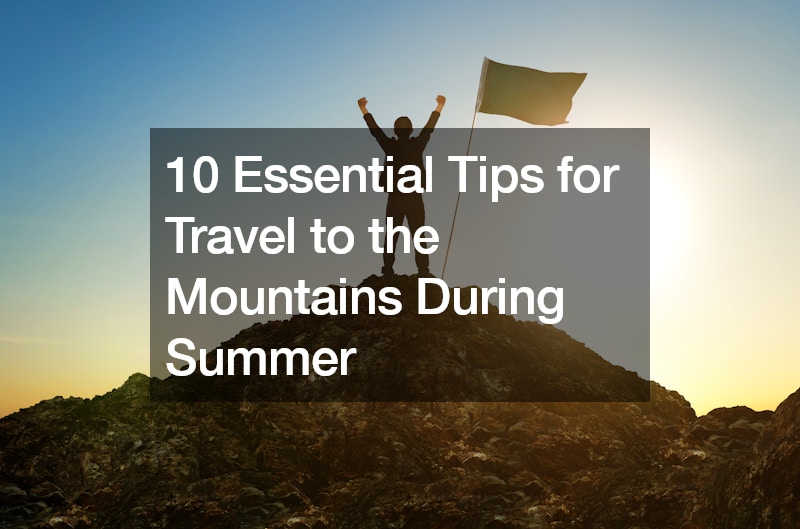

Planning a trip to the mountains can be an exciting and rejuvenating experience. Whether you’re a seasoned hiker or just looking for a peaceful getaway, there are important tips to keep in mind to ensure a safe and enjoyable journey. From visiting local farm stores to being aware of wildlife, this guide covers everything you need to know before traveling to the mountains.
1. Visit Local Shops

Exploring farm stores in the mountain area can give you a taste of the local culture and provide unique souvenirs to bring back home. Support small businesses and discover handmade goods that you won’t find anywhere else. Additionally, taking the time to travel to the mountains by visiting local shops allows you to interact with the community and learn more about the area’s history and traditions.
One of the most rewarding aspects of visiting farm stores in mountain areas is the opportunity to connect with the people behind the products. These small business owners and artisans are often deeply passionate about their craft and eager to share their stories. Engaging in conversations with them not only enhances your understanding of the local culture but also adds a personal touch to your purchases, making each item a cherished reminder of your visit.
In many mountain regions, farm stores offer a diverse array of products that reflect the unique agricultural and artisanal heritage of the area. From freshly harvested fruits and vegetables to artisanal cheeses, homemade jams, and hand-spun wool, the variety is endless. These products are often made using traditional methods passed down through generations, ensuring authenticity and high quality. Purchasing these items supports sustainable farming practices and the preservation of traditional crafts, contributing to the local economy and environmental conservation.
Moreover, farm stores frequently host events and workshops that provide visitors with hands-on experiences. Whether it’s a cheese-making workshop, a farm-to-table cooking class, or a guided tour of the farm, these activities offer a deeper insight into the processes behind the products and the daily lives of local farmers and artisans. Participating in these events can be both educational and enjoyable, giving you a greater appreciation for the hard work and dedication that goes into producing these goods.
Exploring farm stores also allows you to discover seasonal specialties that are unique to the mountain region. Depending on the time of year, you might find wildflower honey in the spring, heirloom tomatoes in the summer, freshly pressed apple cider in the fall, or hand-knitted woolen goods in the winter. These seasonal items not only provide a snapshot of the local agricultural cycle but also make perfect gifts or mementos of your trip.
Visiting these stores can also uncover hidden gems in the local culinary scene. Many farm stores feature small cafes or tasting rooms where you can sample local delicacies made from the farm’s produce. Enjoying a meal or a tasting session allows you to savor the flavors of the region and perhaps discover new favorite foods. This culinary exploration often highlights the freshness and quality of local ingredients, further enhancing your appreciation for the area’s agricultural richness.
In conclusion, exploring farm stores in mountain areas offers a unique and enriching experience that goes beyond simple shopping. It allows you to immerse yourself in the local culture, support sustainable and traditional practices, and bring home authentic, handcrafted souvenirs. These visits create lasting memories and deepen your connection to the places you explore, making your travels all the more meaningful and rewarding. Make sure to check out any specialty farm stores that focus on local produce or handmade crafts for a one-of-a-kind shopping experience.
2. Drive Safely
Before embarking on your journey, it’s essential to ensure that your vehicle is in good working condition and to obey traffic laws to avoid any unnecessary accidents. Consider consulting with a traffic violation lawyer if you have any concerns about driving regulations in the mountain area. When traveling to the mountains, take your time on the scenic roads and be prepared for sudden weather changes that could affect driving conditions. Safety should always be your top priority to enjoy a stress-free trip. It’s also a good idea to familiarize yourself with the route and have a backup plan in case of any road closures or detours along the way.
One of the most critical steps before any mountain trip is conducting a thorough vehicle check. Ensure your brakes, tires, and lights are in optimal condition. Check your tire pressure and tread depth, as mountain roads can be particularly harsh on tires. It’s also wise to carry an emergency kit, including a spare tire, jack, jumper cables, first aid kit, and essential tools. Having a full tank of gas before you set off is equally important, as fuel stations can be sparse in remote mountain areas.
In addition to vehicle maintenance, packing appropriate supplies is crucial. Always carry extra water, snacks, blankets, and warm clothing, as weather conditions in the mountains can change rapidly and unexpectedly. It’s beneficial to have a map or a GPS device, although it’s important to remember that signal reception can be unreliable in remote areas. Download offline maps to ensure you have guidance even without a cell signal.
Weather preparedness cannot be overstated when planning a mountain trip. Check the weather forecast regularly leading up to your trip, and stay updated on any changes. Mountain weather can be unpredictable, with sudden drops in temperature and unexpected rain or snow. Carrying chains for your tires, especially during the winter months, is advisable to avoid getting stuck in snow or ice.
Familiarizing yourself with the driving laws and regulations specific to the region you’re visiting can prevent legal issues. Each area might have unique rules, such as speed limits, wildlife crossings, and regulations on where you can and cannot park or camp. If you’re unsure about specific regulations, consulting with a traffic violation lawyer can provide peace of mind and help you avoid potential fines or legal problems.
Finally, plan for communication. Let someone know your travel plans, including your route and estimated arrival time. Check-in regularly when you have a signal to keep them updated on your progress. In case of an emergency, knowing that someone is aware of your whereabouts can be a lifesaver.
By taking these precautions, you can enjoy the stunning mountain scenery and the adventures that come with it, all while ensuring a safe and enjoyable trip. Preparation and awareness are key to making the most of your journey and creating lasting memories without the stress of unexpected complications.
3. Stay Hydrated
Exploring the mountains can be physically demanding, so it’s crucial to stay hydrated during your trip. Pack a water well tank or portable water bottles to ensure you have access to clean drinking water at all times. Dehydration can lead to fatigue and other health issues, so make it a priority to drink plenty of water throughout the day. If you’re planning on camping or hiking, consider investing in a high-quality water filtration system to refill your water supply from natural sources. Remember that even in cooler temperatures at higher altitudes, you can still become dehydrated quickly, so always be proactive about staying hydrated while traveling to the mountains.
4. Pack Plenty of Food

Having enough food supplies is essential for staying energized and satisfied during your mountain journey. Consider bringing non-perishable items, such as cooking oil disposal packs, snacks, and easy-to-prepare meals that won’t spoil quickly. Depending on the length of your trip, plan your meals and snacks accordingly to avoid running out of food. It’s also a good idea to pack some extra snacks in case of unexpected delays or emergencies during your travels to the mountains. Support local businesses by purchasing food items from farm stores in the mountain area, which often offer fresh and locally sourced products that can enhance your dining experience while on the road.
5. Avoid Littering
Protecting the natural beauty of the mountains is everyone’s responsibility, so make sure to dispose of your trash properly and avoid littering during your trip. Consider a dumpster rental service if you’re camping or planning on producing a significant amount of waste. By practicing Leave No Trace principles, you can minimize your impact on the environment and help preserve the natural habitats in the mountain area. Take your trash with you and recycle whenever possible to keep the surroundings clean and pristine for future travelers. Respect the local wildlife and ecosystems by avoiding littering and following designated waste disposal guidelines to ensure a sustainable and enjoyable experience when traveling to the mountains.
6. Find Ways to Stay Cool
While exploring the mountains, temperatures can vary significantly throughout the day, so it’s essential to find ways to stay cool and comfortable. Consider using AC services or portable fans to regulate the temperature in your accommodations or vehicle. Wearing lightweight and breathable clothing can also help you stay cool while hiking or engaging in outdoor activities during your trip. Don’t forget to pack a hat, sunglasses, and sunscreen to protect yourself from the sun’s UV rays at higher altitudes. Take breaks in the shade or near water sources to cool down and stay hydrated throughout the day. Be mindful of heat-related illnesses and know the signs of heat exhaustion or heat stroke when traveling to the mountains.
7. Have a Heat Source During the Night

As temperatures drop in the mountains at night, it’s important to have a reliable heat source to stay warm and comfortable. Consider bringing heating oil or portable heaters to provide warmth in your accommodations or camping gear. Pack extra blankets, sleeping bags, and warm clothing to layer up during chilly nights in the mountain area. Plan ahead for colder weather conditions and be prepared for sudden temperature changes that could affect your comfort levels during the night. Take precautions to prevent hypothermia and ensure a restful night’s sleep by having a heat source available when traveling to the mountains. Stay cozy and safe while enjoying the starry night sky and serene mountain views.
8. Get Plenty of Rest
Rest and relaxation are essential for enjoying your trip to the mountains to the fullest. Consider consulting with sleep doctors or practicing good sleep hygiene to ensure you get enough rest during your travels. Plan your itinerary with plenty of downtime to unwind and recharge in between activities or sightseeing. Take naps if needed and listen to your body’s signals to avoid exhaustion and burnout while exploring the mountain area. Quality sleep is crucial for maintaining your energy levels and overall well-being, so make sure to prioritize rest and relaxation as part of your travel experience to the mountains.
9. Safely Store Items
Whether you’re camping or staying in accommodations, it’s important to safely store your belongings to prevent theft or damage. Consider using secure storage options or lockable containers to protect your valuables while traveling to the mountains. Label your bags and keep an inventory of your items to ensure nothing gets lost or misplaced during your trip. Use storage facilities if needed to store excess luggage or equipment that you don’t need while exploring the mountain area. Take precautions to safeguard your belongings and maintain a clutter-free space for a stress-free and organized travel experience when visiting the mountains.
10. Be Aware of Wildlife

While admiring the natural beauty of the mountains, it’s important to be respectful of the local wildlife and ecosystems. Consider consulting with bee control experts if you have concerns about encountering bees or other wildlife during your trip. Observe wildlife from a safe distance and avoid feeding or approaching animals in their natural habitats. Be mindful of any signs or warnings about specific wildlife species that may pose a threat to your safety when traveling to the mountains. Practice responsible behavior and follow guidelines for interacting with wildlife to ensure a harmonious coexistence and protect the environment while exploring the mountain area.
Conclusion
Traveling to the mountains offers a unique opportunity to connect with nature, unwind, and create lasting memories. By following the tips outlined in this guide, you can ensure a safe and enjoyable trip that respects the local culture, environment, and wildlife. Plan ahead, stay hydrated, and be mindful of your impact on the surroundings to make the most of your mountain adventure. Whether you’re exploring farm stores, driving safely, or staying cool in the heat, remember to savor every moment and embrace the beauty of the mountains. Embark on your journey with a sense of wonder and appreciation for the natural wonders that await you in the mountains. Travel responsibly, stay informed, and make the most of your mountain getaway for an unforgettable experience filled with adventure and exploration.




More Stories
How Cycling Helps With Weight Loss
Your Basic Guide to Buying From a New Boat Sales Service
Where to Get Ski and Snowboard Rentals